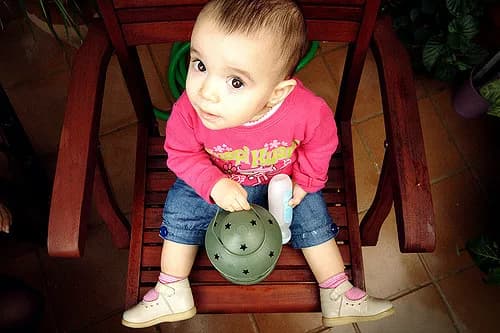
Fathers Can Influence The Sex Of Their Offspring, Scientists Show
It has traditionally been thought that in mammals only mothers are able to influence the sex of their offspring.
But a new study in wild mice led by Dr Aurelio Malo of Oxford University's Department of Zoology has shown that fathers can, in fact, influence sex ratios.
The paper is published in the journal Proceedings of the Royal Society B and involves researchers from the UK, Spain and the USA.
Dr Malo said: 'In mammals, theory predicts that offspring sex ratios can only be determined by the mother, as fathers have always been thought to inseminate an equal proportion of X and Y sperm, having a random effect on offspring sex that they could not shift from equality, or 50:50.
'Also, mothers can influence their offspring in a number of ways from copulation to birth, whereas fathers have control over sperm only. This gives mothers more scope to alter the sex ratio of their offspring. The physical costs of gestation are obviously higher for the mother, so it's in her own interests from an evolutionary point of view to invest her resources wisely in terms of the sex, size and quality of her offspring.
'Using a wild rodent model -- the white-footed mouse -- in lab conditions, we found that there is a relationship between a father's genetic quality and the proportion of sons and daughters he has. We then showed that this relationship is mediated by a trait that is exclusive to the father: the size of the nuclei in their sperm, which reflects the proportion of X to Y sperm. Fathers with higher genetic quality produce sperm with smaller head nuclei -- a higher proportion of Y sperm -- and go on to produce more sons than daughters.
'The implications are important, as we now have the proof that fathers matter independently of any maternal effects. Scientists can now improve their predictive models of sex ratios at birth, including not only mothers but also fathers.'
The researchers also provide an adaptive explanation for why it's in the father's interests to alter the probability of having sons or daughters. According to Dr Malo, one plausible reason is that males of lower genetic quality minimise the cost of having sons, which are more susceptible to the negative effects of inbreeding on fertility, by shifting the sex ratio to daughters, which are more resilient to these negative effects of inbreeding.
Dr Malo added: 'Using a wild species and not a domestic model such as lab mice allows us to extrapolate to other wild species, and to make inferences about adaptation -- that is, why natural selection has selected for this ability in fathers. These findings are potentially applicable to any other mammalian species, including our own. However, the extent to which we find the effects uncovered here depends very much on the mating systems. For instance, in more monogamous species the expectation that fathers would evolve an ability to manipulate sex ratios in their own interests is less clear.
'Predicting sex ratios has great interest for humans, as well as bioethical implications. In domestic species, such as livestock and pets, the ability to manipulate sex ratios has important economic implications. In endangered species, skewed population sex ratios can push species to the brink of extinction, so breeding programmes could pair males and females according to individual attributes that help achieve the rarer sex at birth.
'The long-held expectation that fathers would inseminate the same proportion of X and Y sperm generated at meiosis has stopped scientists from exploring paternal effects in other mammals. By showing that fathers can adjust sex ratios by varying sperm types, we help open the gates of a new research area of paternal effects on sex ratios. For example, do mothers and fathers have the same or opposing sex allocation interests? Does this vary across species and contexts?
'In a nutshell, we now know that dads, as well as mums, can alter the sex of their offspring, and that the ability to do so might have evolved through natural selection.'
Materials provided by University of Oxford. Note: Content may be edited for style and length.
Disclaimer: DoveMed is not responsible for the accuracy of the adapted version of news releases posted to DoveMed by contributing universities and institutions.
References:
Aurelio F. Malo, Felipe Martinez-Pastor, Francisco Garcia-Gonzalez, Julián Garde, Jonathan D. Ballou, Robert C. Lacy. (2017). A father effect explains sex-ratio bias. Proceedings of the Royal Society B: Biological Sciences. DOI: 10.1098/rspb.2017.1159
Related Articles
Test Your Knowledge
Asked by users
Related Centers
Related Specialties
Related Physicians
Related Procedures
Related Resources
Join DoveHubs
and connect with fellow professionals

0 Comments
Please log in to post a comment.